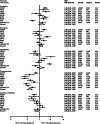Association of personality with the development and persistence of obesity: a meta-analysis based on individual-participant data
- PMID: 23176713
- PMCID: PMC3717171
- DOI: 10.1111/obr.12007
Association of personality with the development and persistence of obesity: a meta-analysis based on individual-participant data
Abstract
Personality is thought to affect obesity risk but before such information can be incorporated into prevention and intervention plans, robust and converging evidence concerning the most relevant personality traits is needed. We performed a meta-analysis based on individual-participant data from nine cohort studies to examine whether broad-level personality traits predict the development and persistence of obesity (n = 78,931 men and women; mean age 50 years). Personality was assessed using inventories of the Five-Factor Model (extraversion, neuroticism, agreeableness, conscientiousness and openness to experience). High conscientiousness - reflecting high self-control, orderliness and adherence to social norms - was associated with lower obesity risk across studies (pooled odds ratio [OR] = 0.84; 95% confidence interval [CI] = 0.80-0.88 per 1 standard deviation increment in conscientiousness). Over a mean follow-up of 5.4 years, conscientiousness predicted lower obesity risk in initially non-obese individuals (OR = 0.88, 95% CI = 0.85-0.92; n = 33,981) and was associated with greater likelihood of reversion to non-obese among initially obese individuals (OR = 1.08, 95% CI = 1.01-1.14; n = 9,657). Other personality traits were not associated with obesity in the pooled analysis, and there was substantial heterogeneity in the associations between studies. The findings indicate that conscientiousness may be the only broad-level personality trait of the Five-Factor Model that is consistently associated with obesity across populations.
Keywords: Longitudinal analysis; meta‐analysis; obesity; personality.
© 2012 The Authors. obesity reviews © 2012 International Association for the Study of Obesity.
Figures


Similar articles
-
Personality and smoking: individual-participant meta-analysis of nine cohort studies.Addiction. 2015 Nov;110(11):1844-52. doi: 10.1111/add.13079. Epub 2015 Aug 22. Addiction. 2015. PMID: 26227786 Free PMC article.
-
Personality traits and body mass index in a Korean population.PLoS One. 2014 Mar 5;9(3):e90516. doi: 10.1371/journal.pone.0090516. eCollection 2014. PLoS One. 2014. PMID: 24598991 Free PMC article.
-
Personality and risk of diabetes in adults: pooled analysis of 5 cohort studies.Health Psychol. 2014 Dec;33(12):1618-21. doi: 10.1037/hea0000003. Epub 2013 Aug 19. Health Psychol. 2014. PMID: 23957901
-
Is personality associated with dementia risk? A meta-analytic investigation.Ageing Res Rev. 2021 May;67:101269. doi: 10.1016/j.arr.2021.101269. Epub 2021 Feb 6. Ageing Res Rev. 2021. PMID: 33561581 Free PMC article. Review.
-
Does personality affect risk for dementia? A systematic review and meta-analysis.Am J Geriatr Psychiatry. 2013 Aug;21(8):713-28. doi: 10.1016/j.jagp.2012.08.004. Epub 2013 Feb 6. Am J Geriatr Psychiatry. 2013. PMID: 23567438 Review.
Cited by
-
Personality and adolescent pregnancy outcomes.J Adv Nurs. 2015 Jan;71(1):148-59. doi: 10.1111/jan.12481. Epub 2014 Jul 18. J Adv Nurs. 2015. PMID: 25040691 Free PMC article.
-
Association between blood lipid levels and personality traits in young Korean women.PLoS One. 2014 Sep 30;9(9):e108406. doi: 10.1371/journal.pone.0108406. eCollection 2014. PLoS One. 2014. PMID: 25268499 Free PMC article.
-
The Role of Personality in the Mental and Physical Health of World Trade Center Responders: Self- versus Informant-Reports.Clin Psychol Sci. 2022;1:10.31234/osf.io/c4gbf. doi: 10.31234/osf.io/c4gbf. Clin Psychol Sci. 2022. PMID: 36407479 Free PMC article.
-
Change in weight and personality in middle-aged and older adults.Psychol Health. 2020 Jul;35(7):872-886. doi: 10.1080/08870446.2019.1679372. Epub 2019 Oct 21. Psychol Health. 2020. PMID: 31631712 Free PMC article.
-
Diabetes Moderates the Link between Personality Traits and Self-Rated Health (SRH).Healthcare (Basel). 2023 Jul 28;11(15):2149. doi: 10.3390/healthcare11152149. Healthcare (Basel). 2023. PMID: 37570389 Free PMC article.
References
-
- Flegal KM, Carroll MD, Ogden CL, Curtin LR. Prevalence and trends in obesity among US adults, 1999–2008. JAMA. 2010;303:235–241. - PubMed
-
- Teixeira PJ, Going SB, Sardinha LB, Lohman TG. A review of psychosocial pre-treatment predictors of weight control. Obes Rev. 2005;6:43–65. - PubMed
-
- Stubbs J, Whybrow S, Teixeira P, et al. Problems in identifying predictors and correlates of weight loss and maintenance: implications for weight control therapies based on behaviour change. Obes Rev. 2011;12:688–708. - PubMed
-
- Elfhag K, Rössner S. Who succeeds in maintaining weight loss? A conceptual review of factors associated with weight loss maintenance and weight regain. Obes Rev. 2005;6:67–85. - PubMed
Publication types
MeSH terms
Grants and funding
LinkOut - more resources
Full Text Sources
Medical

